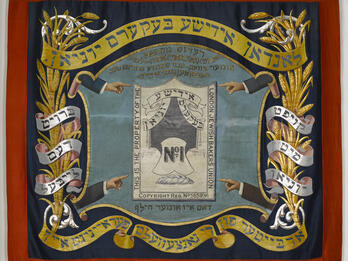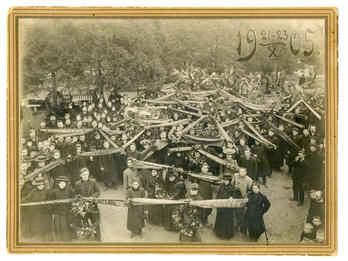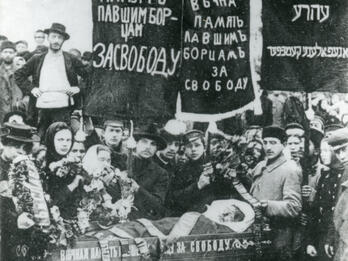Sermon: On Zionism
Upon a lofty mountain ascent, O herald of Zion, raise your voice with strength, O herald of Jerusalem, raise your voice, fear not; say to the cities of Judah: “Behold your God” (Isaiah 40: 9).
Friends! These comforting words of the prophet in our present Haftarah bring to mind two extended periods in my life and recall my impressions from reading the same language on the same Sabbath in the past. One, the first of these periods, is in the relatively distant past. This was in my time as a young man, when I was a youth. I lived then amid circumstances inconceivable to young people today. Living in those situations meant suffering continuous oppression and random deprecation by the oppressors, while my soul oscillated in an imaginary ambience of our past and our glorious future. That was why the people mourned the fall of Jerusalem, the destruction of the Temple, with true sorrow. The awful daily humiliation constantly facing our coreligionists made them keenly aware of the loss of the priceless gems of constitutional and personal freedom. In the sorrowful lamentations of the Ninth of Av, distress calls resounded about the inhuman abuse they experienced in social interaction. Equally clear was the enjoyment palpable on the Sabbath of Solace [Shabbat naḥamu], the present subconsciously mingled with the glorious future. The hope that Zion and Jerusalem would be reconstructed was in fact the hope of redemption from the cruel grip of unscrupulous enemies. The joy engendered by this Sabbath was therefore as true and heartfelt as the mourning that preceded it.
The second period commemorating the Ninth of Av and celebrating the Sabbath of Solace was manifested entirely differently. At that time, I was on the soil of the free and blessed Netherlands. Here too, traces of mourning obviously remained noticeable on these commemorative days; here too, joyful notes of solace resounded from the houses of prayer on the aforesaid Sabbath. But neither the mourning nor the joy seemed heartfelt. This was understandable. After all, the origin of such manifestations of sentiment was not reality but a derived concept. Mourning and joy expressed not an emotional state but a rationale, deriving not from passion but from awareness of religious duty.
The impressions that the quoted discourse of the prophets made on us in the first and the second periods were therefore worlds apart. In both periods, however, the hope inspired in us by this comforting prophesy related only to an indeterminate future shrouded in obscurity. Its rapid realization was presumed to be possible, not probable. How entirely different is the state of mind in which a present reading of the same solace transposes us. The hope it inspires manifests itself entirely differently among a substantial share of our fellow tribe members. After all, the herald of the rising of Zion and Jerusalem has now ascended the mountain and raises her voice without fear. And even if she is not calling out to the cities of Judah “Behold your God!” she still claims Zion and Jerusalem for Judah.
My friends, what meaning can we attribute to this message, what value can we ascribe to it? You know that opinions are divided on this matter. One group turns away from it with reluctance, the other welcomes it with joy and enthusiasm. Where does the truth lie? Let me, my friends, offer the answer, based on the words of Holy Scripture we read today:
But command Joshua and strengthen him and encourage him (Deuteronomy 3: 28).
Whoever has observed the religious indifference before this movement arose knows that its main traits are the same as those of our forefathers in Egypt. Seeing how even civilized and intelligent men bowed to those with other beliefs and flattered them in a saddening and disgraceful effort to be thought of as friends or at least as kindred spirits. That these people lacking in character, who were excluded with contempt and disinclination by those whose favor they curried, were sufficiently self-deprecating to try to gain access to those homes instigates revulsion. Seeing the means that these despicable persons used to become friends with those who were unwilling sparks indignation. No measure, however abhorrent, was eschewed to forsake the birth, the heritage. Nothing was held to be unholy in the hope of plunging the name Israelite into oblivion. You can imagine the state of mind of all those who remained faithful to the banner of Judaism. And now, in these deplorable and discouraging circumstances that impede any hope of better times in the near future, influential men have appeared in public; they are so imbued with the illusion that this is the only way to rescue Israel from its decline and its people from disappearing from history that they have proclaimed that Israel should remember vividly that as a major factor in the history of mankind, it has the right to demand full equality with other great nations and should elevate itself and claim ownership of the land of its fathers as its property. And in the struggle for this reconquest they wanted to be the first to enlist in the army of Israel. We witnessed a great, miraculous history. Of course, like in the days of Joshua, some men among us mistrusted these heroic fellow combatants, because they wanted to fight only for Israel, not for the religion of Israel. But they who remembered the previous sorrowful disposition of the religious indifferent saw and see this reversal as a guarantee that the true Jewish spirit in Israel will be rekindled, with a passion that sows the seeds of true religious devotion. Therefore, we follow not the example of the contemporaries of Joshua but those of Joshua himself and his immortal master. See there, my friends, why we continue to welcome with delight and rejoice at a movement that arose so miraculously and has already achieved much goodness and greatness. See there, finally, why we hope, now that the herald has raised her voice without fear on the mountain, that she has ascended to announce the rise of Zion and Jerusalem, and that she will soon be able to call out to the cities of Judah as well: “Behold your God. Amen!”
Translated by Lee Mitzman.
Credits
Joseph Hirsch Dünner, Het Zionisme [Sermon: On Zionism] (The Hague: Levisson, 1905), pp. 5–6, 14.
Published in: The Posen Library of Jewish Culture and Civilization, vol. 7.





